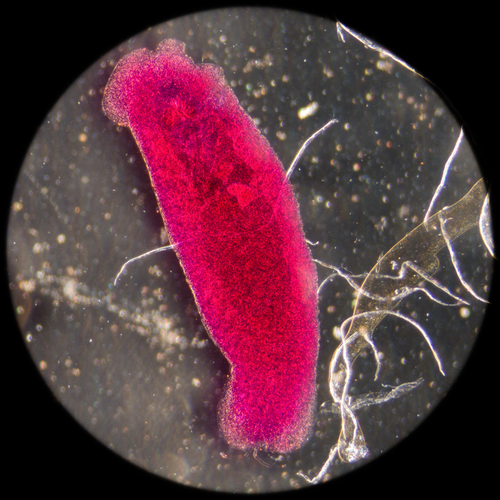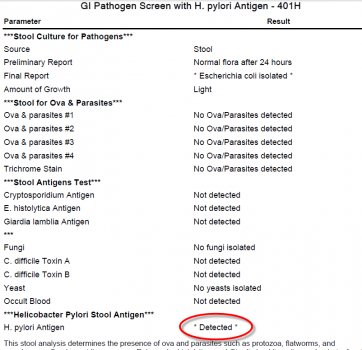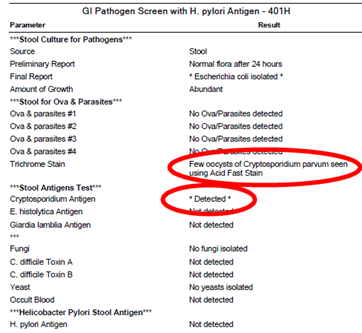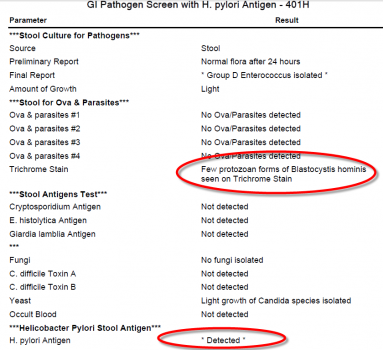3 Common Gut Infections (Found with the Right Stool Testing)

We’ve been talking about gut infections a lot lately. Why?
Because it’s the first place to look if you’ve done everything with diet and STILL don’t feel better.
Like 5 years ago, when I followed a STRICT diet of 7 foods and still struggled with diarrhea… until my stool test result came back with the words: “Strongyloides stercoralis”
That’s the parasitic roundworm infection I had.
Once I treated the infection everything about my health changed. It’s almost like I’d been driving with one foot on the gas and one foot on the break the whole time, and now my health was going 100 mph toward a beautiful horizon.
The parasite was there the whole time, wreaking havoc on my gut and preventing me from fully healing. It was a big step in my healing journey… not the only one of course, but a huge leap forward.
And once we started working with 1-on-1 clients, I knew proper stool testing would be one of the most important steps toward helping our clients get healthy.
But All Stool Tests are Not Created Equal
Most of our 1-on-1 private clients require reliable stool testing. These people are doing everything right with diet, supplements, and lifestyle… but just like me, they struggle with lingering digestive problems that don’t add up. Worse yet, most of them have done stool testing in the past and the results were negative.
The truth is stool testing is really complex and challenging.
There’s no perfect stool test out there (yet)
I could go in-depth on the science of stool testing, but it comes down to this: there’s no perfect stool test out there… yet. Each has it’s own accuracy level, reliability, positives, negatives, etc. And the most important thing for our clients is to avoid a false negative. If there’s something there, we want to be able to find it.
Which is why for a long time we combined two stool test results together to get the most accurate picture of their gut health.
But the stool testing industry is changing a lot and so is our trust in labs. With everything in flux, the one constant stool test that continues to support our clients is from BioHealth (no affiliation).
The BioHealth #401H GI Pathogen Screen
This test uses advanced staining and antigen techniques to recover pathogens from 4 stool samples, with one sample taken each day.
Here’s 3 Case Studies of the most common GI Infections we’re seeing over and over again.
Of course, these are anonymous and any and all personal details have been removed for their privacy… but just seeing the results themselves is astonishing. I’ve shared these examples before, but I continue to see these over and over and over again so I think it’s important.
1) H. pylori: 57-year-old female with severe Ulcerative Proctitis
She came to us with severe bloating, constipation, nausea, and GERD. Here are her test results:
H. pylori is a common bacterial infection with our clients. Some practitioners don’t treat it and there’s still debate about whether or not it’s a problem. There’s some interesting new research coming out that suggests it can be helpful in some cases (like if kids get it very young). All I know is: when people with GI problems kill it, they feel a lot better. So if they have symptoms and a positive test result, I think it makes sense for them to work with a skilled practitioner to clear it.
Most often it can suppress stomach acid and cause a cascade of problems like GERD, acid reflux, gastritis, ulcers, and stomach pain. There are studies that suggest it doesn’t cause overt symptoms in 85% of those infected.
2) Cryptosporidium: 45-year-old male with Celiac Disease
He came to us with severe diarrhea, stomach pain, malnourished, and depressed. Here are his test results:
Cryptosporidium is a parasite that travels to your small intestine and then burrows into the walls of your intestines, wreaking havoc long-term in those with a compromised immune system. It’s most commonly from drinking unfiltered or untreated water or from swimming in pools with bad sanitation (some strains of Cryptosporidium are chlorine-resistant).
3) Blastocystis hominis: 65-year-old female with Crohn’s
She came to us suffering with diarrhea, strictures, and fatigue. Here are her test results:
Blastocysistis hominis is a microscopic parasite that usually comes with overt GI symptoms like diarrhea, cramping, bloating, gas, fatigue, and sometimes even anal itching. Most people definitely notice an improvement once this bad bug is gone from their life. Most often it is caused by fecal-oral transmission, from both animals or humans. Many notice GI symptoms finally go away after working with a skilled practitioner to kill it.
How to Kill These 3 Gut Infections
I hope these 3 results had an impact on you. I wish I could have seen them years ago when I was banging my head against the wall trying to figure out what was really going on in my gut.
Since working with 500 people 1-on-1 over the last 2 years, we’ve seen 100’s of examples of the same exact test results I just showed you.
If you’re still struggling with digestive problems despite all your best diet, supplement, and lifestyle changes… you could have a parasite or bacterial infection. I highly recommend you check out our GI Infections call, where we dive into how to kill these bad bugs…
Grab your seat for our 2.5 hour Gut Infection Call
In the call we cover:
- NEW testing strategies to find parasite and bacterial infections
- Who needs to kill them right away and who should actually wait
- AND – HOW to kill these bugs with step-by-step protocols from the top chronic health practitioners
Get access to the GI Infections call today: http://gutinfections.scdlifestyle.com
– Jordan
Did You Like this Article?
Subscribe to our newsletter to receive email notifications, some ways to find relief, and next steps.



